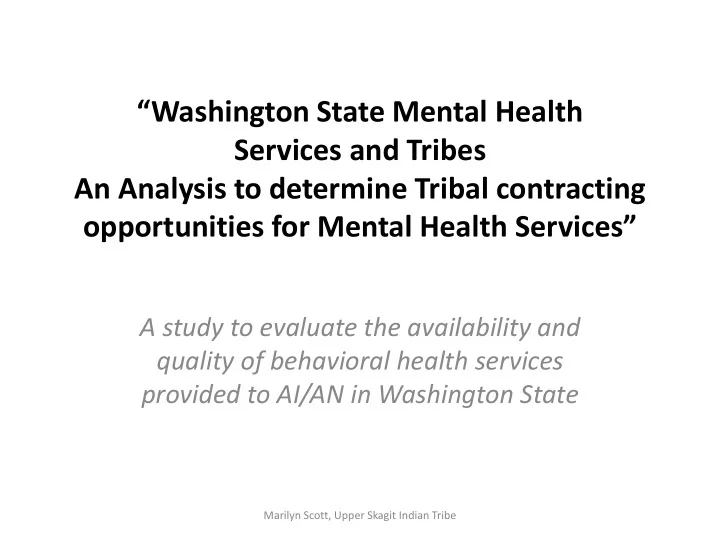

“Washington State Mental Health Services and Tribes An Analysis to determine Tribal contracting opportunities for Mental Health Services” A study to evaluate the availability and quality of behavioral health services provided to AI/AN in Washington State Marilyn Scott, Upper Skagit Indian Tribe
Key Issues to developing a Tribal-centric Behavioral Health System 1. The State and RSNs must develop a process to accept referrals from Tribal providers for specialized mental health services 2. The State and RSNs must develop a process of reciprocity to honor involuntary commitments from Tribal courts with appropriate jurisdiction 3. The State, RSNs, and Tribes need to develop a coordinated discharge planning process for those clients leaving specialty and inpatient mental health services Marilyn Scott, Upper Skagit Indian Tribe
Report Recommendation #1 • The RSN system has not proved to be effective, accessible, or culturally competent for use by AI/AN patients nor has there been effective participation with tribal providers. • The State must acknowledge that it has a shared responsibility with the federal government to provide health services. • This responsibility should not be delegated to RSNs, municipalities or other governmental entities. Marilyn Scott, Upper Skagit Indian Tribe
Report Recommendation #2 • The state needs to develop intensive efforts to address cultural competency issues and problems by deeming tribally certified professionals and facilities as eligible to be reimbursed for Medicaid and State funded services. • This will increase the culturally competent mental health service providers and AI/AN access to services, since tribal programs excel in the focus on the patient/client as a whole person who must be able to interact with multiple entities in their communities. Marilyn Scott, Upper Skagit Indian Tribe
Report Recommendation #3 • The State, in consultation with tribal governments should develop a reimbursement system that is direct and responsive to meet the needs of AI/AN patients and clients. • This includes, but should not be limited to increasing the contracting opportunities to increase mental health services between RSNs and Tribes. • Under the next request for the 1915 waiver, additional innovative mechanisms could be offered to CMS (i.e. block grants, FFS) to reduce administrative costs from multiple levels of administrative pass through. Marilyn Scott, Upper Skagit Indian Tribe
Recommendation #4 • There must be reimbursement for all tribal behavioral health services to maintain the economy of scale for basic services. • Because of lack of parity of reimbursable services, current programs are over burdened and consequently do not have the ability to cost-shift expenses to maintain basic mental health programs and services. Marilyn Scott, Upper Skagit Indian Tribe
Recommendation #5 • The State Medicaid plan needs to be changed to include more mental health reimbursable services for prevention and co-occurring disorders. • Without a change in reimbursement for mental health service the health status of AI/ANs will continue to decline resulting in additional cost or worse, mortality and certainly morbidities that could be prevented. • A reimbursement mechanism that is not administratively burdensome, allows most of reimbursement/funds to be applied to direct services must be developed to reduce the burden and impact of mental health issues before it overwhelms our communities. Marilyn Scott, Upper Skagit Indian Tribe
Recommend
More recommend